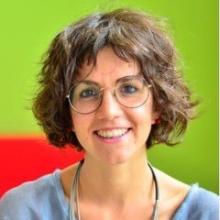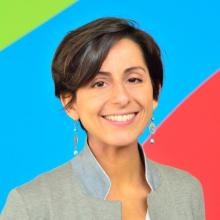Festival 2024 > About
About
The Festival
The Citizen Participation and Deliberative Democracy Festival brings together people who are interested in the engagement of citizens through deliberative and other participatory formats in science and policymaking, with participants from the EU and national public institutions, politicians, representatives of civil society organisations, researchers, practitioners, artists and ordinary citizens.
Organised by European Commission’s Competence Centre on Participatory and Deliberative Democracy (CC-DEMOS), the Festival is also the main networking event of its Community of Practice. The programme features a variety of activities, including expert panels, conversations, workshops, artwork presentations, exhibitions of participatory projects and hands-on presentations of methods and tools. We aim to shed light on the opportunities and challenges that the engagement of citizens in science and policymaking is facing.
When & where
in 2024, we met in Brussels, on 12-14 June. The main part of the programme took place in the CDMA building (21 Rue du Champ De Mars, 1050 Ixelles, Brussels), with side events across the city. The sessions organised together with the JRC SciArt Project took place at the iMAL Art Center for Digital Cultures & Technology (30 Quai des Charbonnages, Koolmijnenkaai, 1080 Brussels). On one of the days, participants had an opportunity to join a guided tour across Brussels, to discover its public spaces and their role in the political and social life of the city.
2024 theme
The theme for the 5th Festival was the engagement of citizens in addressing environmental issues. This includes, for instance, transversal concerns related to climate change, biodiversity loss and pollution, environmental health, land use, oceans, as well as regional and local issues such as climate-neutrality of cities and energy transition. Over the last few years, and in response to these issues, we have seen a growing number of participatory processes, such as citizen assemblies, focusing on biodiversity and climate change across Europe – and the world – convened both by public and non-governmental bodies at local, regional, national and global levels, as well as many other non-invited formats of citizen engagement. We brought our research, practitioner and policymaker communities together to discuss these initiatives and reflect on how to use these tools to help strengthen our democracies and give citizens a meaningful say in policies that concern them.
The theme also engaged directly with the European Green Deal, one of Commission’s priorities, with its goals of climate neutrality by 2050 and those set in the biodiversity strategy for 2030. To make the green transition just, fit-for-purpose and sustainable in the long term, the involvement of citizens is paramount. In this context, in 2023 the Commission ran a European Citizen Panel on food waste, and in 2024 another one focused on energy efficiency.
And yet, the relation between environmental action and democracy, or even more so citizen engagement, is by no means obvious, as a recent survey in European countries illustrates: ‘53% of young Europeans place more confidence in authoritarian states than democracies when it comes to addressing the climate crisis’.
Between political tensions, the legal and institutional frameworks in place and the alarming calls from scientists about deteriorating environmental conditions – How much power do citizens actually have to influence decision making processes? Can co-creation processes, including with the most vulnerable or affected by the issue of concern help avoid the negative consequences not only of climate change, but also of so-called green policies? Have the processes to date helped address the political divisions in this area or support systemic transformation? What role for different ways of engaging and spaces of participation to navigate such uncharted waters? How are participatory processes being integrated with the established governance mechanisms from local to the international levels? These are some of the questions we addressed over the three days of the Festival.
Festival summary
The first day of the Festival explored the potential of citizen engagement in advancing the green transition. The key conclusion? Citizen engagement practices can better support the green transition compared to dependence on technocratic approaches of top-down governance informed by narrowly defined expertise. Indeed, we should recognise that citizens are experts of their everyday daily lives, drawing on first-hand knowledge of how environmental issues – and the policies that try to address them – impact their lives. However, establishing sustainable citizen engagement ecosystem requires a consistent, long-term commitment. In this regard, overcoming barriers to citizen engagement and creating conditions for meaningful participation remain essential. We can take EU initiatives as an example: European Citizens’ Panels, Citizens’ Engagement Platform and the Have Your Say portal remain little known and require more extensive communication to make them recognisable among European citizens. Panelists highlighted the importance of integrating new technologies, ensuring accessibility to all, providing information access and effectively implementing citizen engagement at the local and regional levels.
During the second day, we discussed the significance of public spaces for the survival of democracy and social cohesion. The high-level panel opened with reflection on a paradox: the increase in power of populist parties and lower voter turnout in EU elections despite enhanced efforts to mainstream democratic innovations. So, what can EU institutions do? Not only to signal, but also to prove to citizens the importance and effectiveness of their participation in new democratic practices, make participation mechanisms more accessible, choose topics reflecting everyday discussions and key social tensions that motivate those in society to address contentious issues that may create divisions. Responding to the diminishment of public spaces and freedoms in EU countries and beyond, experts called for the creation of prominent and accessible public spaces – both online and physical - designed to encourage meaningful discussions on complex issues. These spaces should support diverse voices, facilitate opinion-sharing across society and prompt democratic institutions to effectively respond to them.
The last day of the Festival was dedicated to exploring how Indigenous and traditional knowledge can contribute to addressing environmental issues. In preparation, participants were invited to do some soul searching: Why is it that only one way of knowing is put on a pedestal in its access to policymaking? Honest answers will recognise the intersectionality of knowledge, the need to provide adequate resources for Indigenous communities and the importance of decolonisation, while looking at the potential of co-creation and arts as methods of engagement. Emphasising the necessity of integrating Indigenous communities within a holistic approach to knowledge-for-policy, the conversations highlighted the significance of international cooperation and partnerships, as exemplified by initiatives such as the Atlantic and Arctic basins lighthouse and the All-Atlantic Ocean Research and Innovation Alliance. How do we proceed? Dismantling knowledge silos and disciplinary boundaries in science and policy making is essential, but co-creation alone is not sufficient to achieve this goal. Researchers must acknowledge their own normativity and embrace action research to transform knowledge systems and reconsider established epistemologies.
Meet the Festival Team

Ângela has been at the European Commission’s Joint Research Centre since 1992. She leads the Competence Centre on Participatory and Deliberative Democracy, contributing to mainstream citizen engagement practices across the EU policy cycle and science. She has been involved in many European projects focusing on environmental and technology governance, future-oriented activities and public engagement institutionalisation. Post-normal science inspires her work on governance of and dialogues about policy, science and technology.

Paulo is a policy analyst at the European Commission's Joint Research Centre. He provides advice and support to the various activities of the Competence Centre on Participatory and Deliberative Democracy. His current work focus is the Conference on the Future of Europe.

Tessa has worked at the European Commission’s Joint Research Centre since 2017. She works on the Community of Practice for the Competence Centre on Participatory and Deliberative Democracy. Tessa completed a Masters degree in ecological economics and sustainability at the Institute for Environmental Science and Technology (ICTA) at the Autonomous University of Barcelona and is now completing her PhD on political science at the same institution. Prior to this work, Tessa was a television journalist at Reuters in Hong Kong before working as a Communication Expert at the European Forest Institute in Barcelona.

Mateusz works as a policy analyst at the JRC, supporting the work of the Competence Centre on Participatory and Deliberative Democracy. He has a background in media studies and environmental studies, with particular focus on environmental ethics. He currently coordinates projects on the engagement of citizens in the protection of biodiversity. Previously, he worked as a researchers as well as scientific and literary editor.

Anna Paola works as a Policy Analyst at the Joint Research Centre, European Commission. She has an interdisciplinary background rooted in economic and political geography, food studies and critical theory. Her work currently focuses on participatory governance of environmental issues and public spaces for citizen engagement.

Ventseslav is a Policy Analyst at the European Commission and is part of the team behind the CC-DEMOS. Ventseslav works on the elaboration of practical guidelines for the evaluation of citizen engagement processes, and contributes content on practices and methods of citizen engagement to the training offer of the CC-DEMOS.

Elisa is policy analyst at the JRC and contributes to the work of the Competence Centre on Participatory and Deliberative Democracy in the field of evaluation of citizen engagement processes, training and capacity building, as well as in specific policy files such as pollinators’ protection through the STING project.

Francesco works as knowledge management assistant at the JRC, providing support to the Competence Centre on Participatory and Deliberative Democracy. Previously, he worked at the European Commission as policy assistant in the fields of union citizenship, consular protection and free movement as well as development and promotion of the external dimension of the EU's employment and social policies.

Roxanne has a multidisciplinary background. After her studies in Comparative Literature and Cultural Anthropologie at University of Vienna, driven by her interest she started working in theatre and cultural associations on communication, transliteracy and education and got more and more into the field of project management. She is currently secretary of the Unit S.2 JRC.

Viktoria is supporting the work of the Competence Centre on Participatory and Deliberative Democracy as a trainee at the JRC. She has an interdisciplinary background in Equality Studies and English and Spanish Philology, with focus areas on socioeconomic injustices, intersectional research paradigms and literature. She has previously worked on the intersections of human and environmental rights and international cooperation.

Despite his interests in literature and ancient music, Alessandro has a technical and scientific background. He started working in the Information and Communication Technology field in the '90s, focusing into web application developing. He covered many roles, from developer to Chief Information and Technology Officer. He is now a consultant supporting the Competence Centre on Participatory and Deliberative Democracy at JRC.
